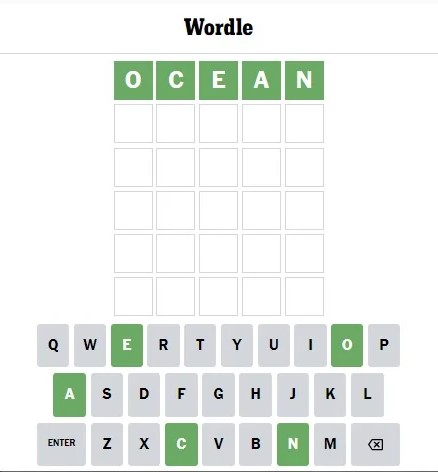John McPhee on Wordle
 In “Tabula Rasa” (No.4) published in The New Yorker last May, the legendary nonfiction writer John McPhee shared his tactics around Wordle. I wasn’t surprised he’d made a study out of something many of us do by the seat of our pants every day. For example, he has used the following words:
In “Tabula Rasa” (No.4) published in The New Yorker last May, the legendary nonfiction writer John McPhee shared his tactics around Wordle. I wasn’t surprised he’d made a study out of something many of us do by the seat of our pants every day. For example, he has used the following words:
“…vague, suave, juice, poise, abode, quoit, laity, voice, ideal, cameo, abide, cause, maize, orate, image, moxie, outer, arise, vireo, viola, emoji, patio, radio, louse, vogue, biota, sauce, laude, route, gauze, aerie, ounce, adieu, ouija, aside, mouse, audio, ratio, media, abuse, avoid, outre, omega, imbue, beaut, audit, ukase, movie, raise, irate, pause, atone, curie, rouse, and yodel, but my all-time preference is ocean.”
 “Ocean, chair, batch, yacht—a mid-March progression, just one more example from the autodidact zone, but it caused me to wonder about the “ch” in “yacht.” What would an expert call it? A silent digraph? I wrote to Mary Norris. Once known as the Pencil Lady, Mary is the author of books on language (“Between You & Me: Confessions of a Comma Queen,” “Greek to Me”) and for several decades was a copy editor, grammarian, query proofreader, and page O.K.’er at The New Yorker. She would not be intimidated by the ch in “yacht.”
“Ocean, chair, batch, yacht—a mid-March progression, just one more example from the autodidact zone, but it caused me to wonder about the “ch” in “yacht.” What would an expert call it? A silent digraph? I wrote to Mary Norris. Once known as the Pencil Lady, Mary is the author of books on language (“Between You & Me: Confessions of a Comma Queen,” “Greek to Me”) and for several decades was a copy editor, grammarian, query proofreader, and page O.K.’er at The New Yorker. She would not be intimidated by the ch in “yacht.”
“It’s a ‘velar fricative,’ Mary wrote back. ‘That is the actual name of the ch in yacht. I’d call it a vestigial guttural consonant cluster and avoid having it for breakfast. From the Dutch (jaght), who always sound like they’re choking…”